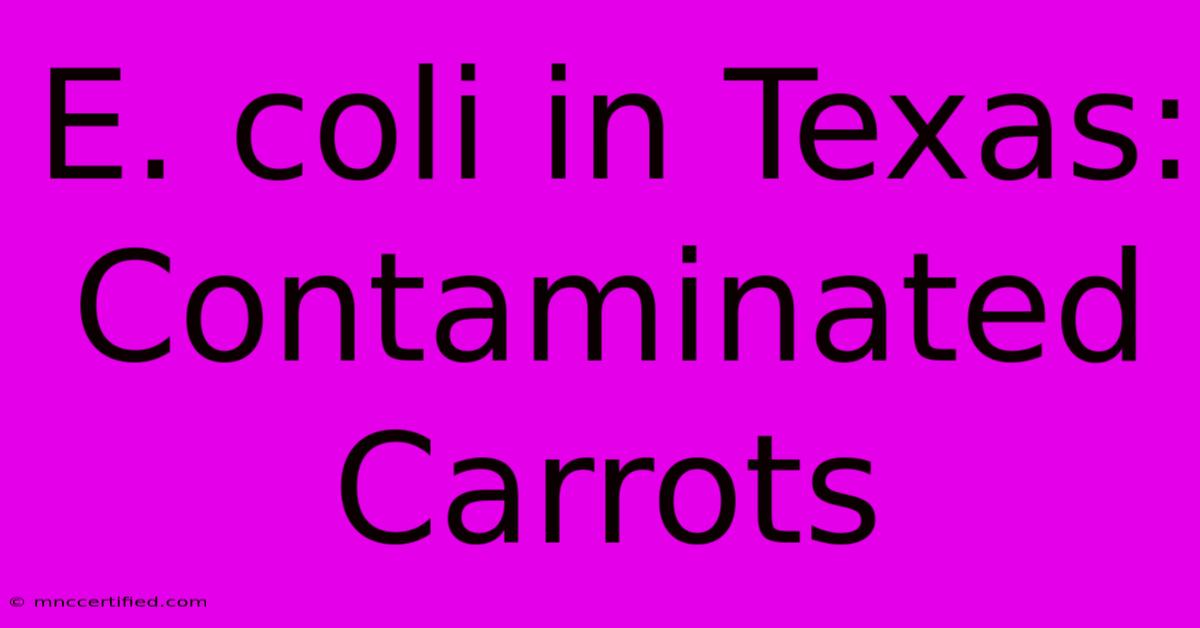E. Coli In Texas: Contaminated Carrots

Table of Contents
E. coli in Texas: The Danger Lurking in Your Carrots
Texas, known for its vast landscapes and diverse agriculture, recently faced a concerning outbreak linked to contaminated carrots. This article delves into the specifics of this E. coli outbreak, highlighting the dangers of contaminated produce, preventative measures, and the importance of food safety awareness.
Understanding the E. coli Threat
Escherichia coli (E. coli) is a type of bacteria commonly found in the intestines of humans and animals. While most strains are harmless, some, like Shiga toxin-producing E. coli (STEC), can cause severe illness. These strains produce toxins that can lead to various symptoms, ranging from mild diarrhea to life-threatening complications like hemolytic uremic syndrome (HUS). HUS is particularly dangerous, as it can cause kidney failure, especially in young children and the elderly.
The contamination of carrots with E. coli in Texas underscores the critical need for robust food safety protocols at every stage of the food production chain, from farm to table. This outbreak serves as a stark reminder that even seemingly safe foods can pose serious health risks if proper sanitation and handling procedures are not followed.
The Texas Carrot Contamination Outbreak: A Case Study
While specific details regarding the source of the contamination and the extent of the outbreak may vary depending on the timing of this article's publication, investigations typically involve tracing the carrots back to their origin. This includes examining farming practices, processing plants, and distribution networks. Authorities conduct extensive testing to identify the specific strain of E. coli involved and to determine the scope of the contamination. This information helps to implement effective control measures and prevent further spread. Staying updated through official channels like the Texas Department of State Health Services and the CDC is crucial.
Symptoms to Watch For
If you suspect you've consumed contaminated carrots and experience any of the following symptoms, seek immediate medical attention:
- Severe diarrhea (often bloody)
- Stomach cramps
- Vomiting
- Fever
- Fatigue
- Headache
Early diagnosis and treatment are critical in mitigating the severity of E. coli infection and preventing complications like HUS.
Preventing E. coli Contamination: A Multi-pronged Approach
Protecting yourself from E. coli contamination requires a multifaceted approach encompassing various stages of food handling:
Farm to Table Best Practices:
- Farmers: Adherence to strict hygiene protocols, including proper irrigation and fertilization techniques, is vital. Thorough washing of produce before processing is essential.
- Processors: Maintaining sanitary conditions throughout processing, including proper cleaning and disinfection of equipment, is paramount.
- Retailers: Displaying produce correctly and maintaining refrigeration temperatures are critical in preventing bacterial growth.
- Consumers: Thorough washing of produce before consumption is non-negotiable. Proper handwashing after handling raw produce is equally important.
Safe Handling Practices at Home:
- Wash your hands: Wash your hands thoroughly with soap and water before and after handling food.
- Wash your produce: Wash all fruits and vegetables, including carrots, under running water before eating them. Scrub firm-skinned produce with a brush.
- Cook thoroughly: Cook ground beef and other meats to an internal temperature of 160°F (71°C) to kill E. coli.
- Separate raw and cooked foods: Avoid cross-contamination by using separate cutting boards and utensils for raw and cooked foods.
- Refrigerate promptly: Refrigerate perishable foods promptly to slow down bacterial growth.
Staying Informed and Protecting Your Family
Staying informed about food safety alerts and outbreaks is crucial for protecting your family's health. Regularly check the websites of the Texas Department of State Health Services, the Centers for Disease Control and Prevention (CDC), and other relevant agencies for updates and advisories.
By following these preventative measures and staying informed, you can significantly reduce your risk of E. coli infection from contaminated carrots and other foods. Remember, proactive food safety practices are the best defense against foodborne illnesses.

Thank you for visiting our website wich cover about E. Coli In Texas: Contaminated Carrots. We hope the information provided has been useful to you. Feel free to contact us if you have any questions or need further assistance. See you next time and dont miss to bookmark.
Featured Posts
-
Provalue Insurance Garden City Ks
Nov 19, 2024
-
Mc Guigan Praised On I M A Celeb
Nov 19, 2024
-
Pre Game Metal Fall At At And T Stadium
Nov 19, 2024
-
Escobedo Insurance Brownsville Tx
Nov 19, 2024
-
M4 Partial Closure Bridge Emergency Repairs
Nov 19, 2024